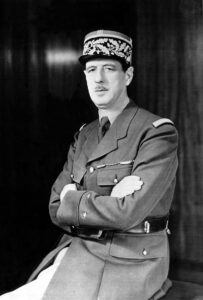Charles de Gaulle

He was a distinguished officer of the First World War, was wounded several times and subsequently taken prisoner in Verdun. In the interwar period, he promoted a strategy of using mobile armoured divisions in battle. During the German invasion in May 1940 he led a division of tanks to counter-attack German units. He did not accept the government’s cease-fire with Germany and, with the help of Winston Churchill, escaped by air to England, where he called on the French to resist the occupation and continue their fight. During the war he led the Free French and became the unquestioned leader of the French resistance. He also became head of the Temporary Government of the French Republic in June 1944. In 1944–1945, the French army led by De Gaulle transformed itself into a fourth power in the anti-Hitler coalition in Europe. De Gaulle introduced economic reforms in France as a result of which a 30 year period of economic growth ensued, known as the Trente Glorieuses. In 1958, Time magazine named De Gaulle Man of the Year. He resigned in 1969 after losing a referendum on Senate reform. He died one year later at his residence in Colombey-les-Deux-Églises. De Gaulle exerted enormous influence on many future French politicians and is one of the greatest figures in French history. Many streets and monuments in France have been dedicated to his memory.